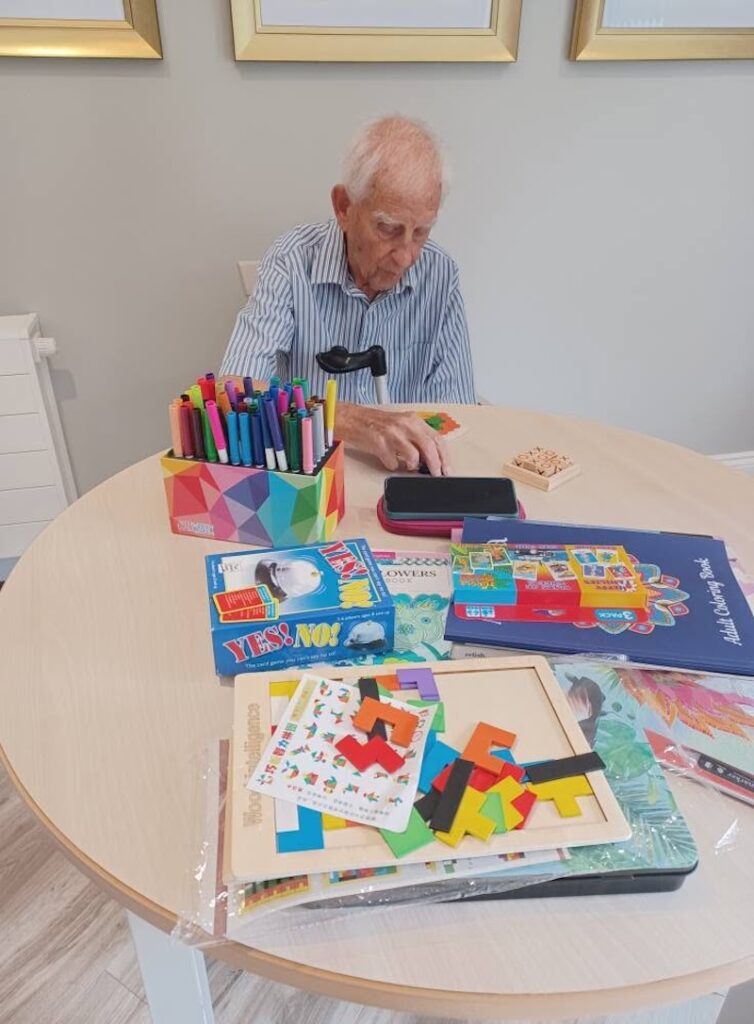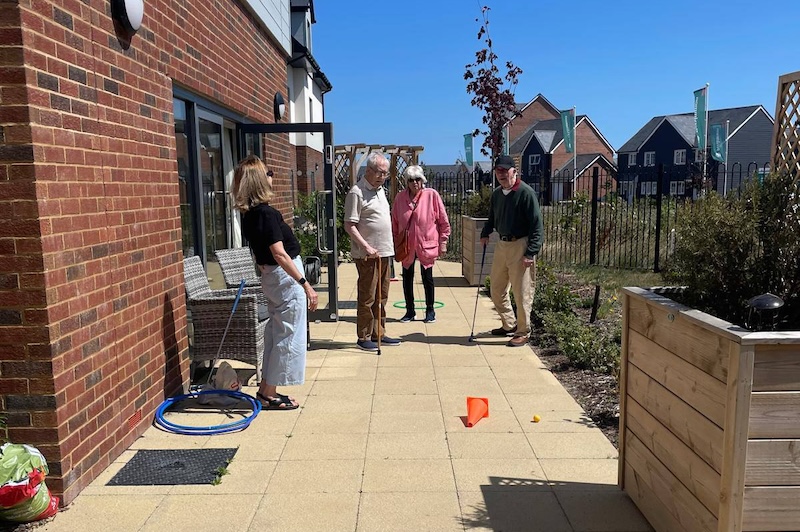The Benefits of Sensory Stimulation for Older Adults

As people age, maintaining engagement with the world through the senses plays a pivotal role in supporting well-being and quality of life. For older adults, particularly individuals with dementia, sensory stimulation offers profound benefits that impact daily living and emotional well-being.
As time goes on, care homes and nursing homes are increasingly recognising the importance of providing sensory activities and are integrating them into their routines to foster connection and boost memory. In this blog, we explore the importance of sensory and memory stimulation and the benefits it brings for residents living with dementia.
What is Sensory Stimulation?
Sensory stimulation involves activating one or more of the five senses through a range of experiences designed to improve residents' cognitive function and encourage feelings of reminiscence. For older adults or individuals with dementia, sensory stimulation can provide more variety to their day and help them reconnect with the world around them in safe and enjoyable ways.
The Benefits of Sensory Stimulation
Enhancing Cognitive Function and Memory
Sensory activities lead to cognitive stimulation for older adults which improves their memory, attention and overall brain health. When residents participate in simple sensory activities, whether listening to familiar music or engaging in art therapy, they are often able to recall memories, hold conversations and engage with daily tasks with more ease.
Reminiscence therapy is a key example of how sensory and memory stimulation can bring back lost memories in people living with dementia. The use of music, scents, or tactile objects helps trigger connections in the brain, fostering moments of clarity and facilitating improved communication with fellow residents and carers. For many individuals, these experiences contribute to a heightened sense of belonging and enrich daily life.
Supporting Emotional Wellbeing and Reducing Anxiety
Meaningful sensory engagement provides significant emotional well-being benefits for older adults, especially those who are living with a dementia diagnosis. Sensory stimulation is often linked to reduced anxiety and improved mood by offering a calming effect and a sense of confidence.
Music therapy, in particular, can help residents relax by recalling comforting melodies or rhythms from their past. Sensory play, like hand massages with different lotions or simple activities involving scent or texture, can promote relaxation and foster an atmosphere of safety and peace. Over time, these practices may reduce feelings of agitation and help residents manage the stresses associated with cognitive impairment.

Boosting Communication and Social Connection
For residents whose cognitive impairment limits verbal expression, sensory stimulation activities can enhance communication by providing alternatives for them. Tactile activities, such as exploring different textures or participating in collaborative art projects, encourage residents to engage and connect with others nonverbally.
Shared sensory activities like baking or arts and crafts also support social bonds between residents, carers and family members. By finding non-traditional ways for residents to communicate, it helps them feel like they belong and connect with like-minded individuals.
Improving Quality of Life and Daily Living Skills
The benefits of sensory stimulation for older adults extend into practical areas of daily living. Engaging in activities that involve fine motor movements, such as sorting objects by shape or texture, manipulating stress balls, or painting, can help maintain physical dexterity, sensory perception and independence.
Participating in sensory play activities also improves self-confidence and encourages residents to remain curious about the world around them. This interest in the wider environment helps sustain motivation and purpose, which are crucial elements for well-being and overall quality of life.
Promoting Calmness and Better Sleep
By engaging multiple senses throughout their everyday tasks, residents feel more relaxed and calm which leads to improved sleep quality. Activities such as listening to soothing music in the evening, calming aromatherapy, or gentle hand massages before bed set the scene for peaceful nights. Improved sleep directly also benefits cognitive function and emotional stability by supporting the body’s natural rhythms.


Creating Meaningful Moments at Every Stage of Dementia
One of the biggest advantages of sensory stimulation for those living with dementia is its adaptability. Whether a resident is experiencing early stages of dementia or is further along in their journey, activities can be tailored to their individual needs, which ensures they can benefit regardless of their abilities or memory retention.
Some care homes offer sensory rooms, which is a dedicated environment with elements to engage those living with sensory impairment, but this isn't always essential. There is opportunity in all aspects of daily life to introduce sensory activities and allow residents to reap the benefits. The versatility of sensory engagement allows carers to quickly respond to residents’ individual needs and preferences in line with their tailored care plan, creating positive experiences that truly reflect their personality.
Training and Implementation in Dementia Care
Staff training plays a crucial role in maximising the benefits of sensory and memory stimulation. Teams who are skilled in observing reactions and adapting activities to individual needs and interest ensures they can provide the highest quality of life. As care homes shift toward more holistic therapeutic approaches to care, sensory interventions are becoming central elements within dementia care as they help to improve both psychological symptoms and cognitive impairment.
Ongoing training enables carers and activities coordinators to implement new sensory stimulation activities, learn the nuances of individual preferences and adapt routines according to the changing needs of residents.
The Power of Sensory Stimulation When Choosing a Care Home
When considering care options, families and individuals often look at staffing, facilities and safety. However, the regular activities can be a key factor in enhancing the lives of residents, especially for those with dementia. A care home that actively uses sensory engagement as part of their activities program would typically demonstrate a deeper commitment to improving the emotional and cognitive health of its residents.
It is important, when searching for a care home, to find an environment that truly prioritises all aspects of well-being for yourself or your loved one. Beyond the personal and medical care, choosing a dementia care home that incorporates sensory stimulation into its approach ensures that residents are truly valued and supported around the clock.
Visiting a care home and asking questions about their sensory activities first-hand is one of the best ways to get an insight into whether it is the right place for you or your family member. When you choose a care home that holistically supports its residents, it can provide a huge sense of reassurance and peace of mind.


Sensory Activities at Caraway House Care Home
At Caraway House Care Home, we understand the role of sensory stimulation for older adults, especially those living with dementia. Sensory activities are carefully integrated into our daily routines and activities which supports our residents' cognitive function, reduces any anxiety and improves their overall quality of life. Common sensory activities we hold at our care home in West Sussex include hand massages, arts and crafts, music therapy, reminiscence therapy, nail painting, food tasting and more. Our activities programme is fully shaped around our residents and their individual needs, so we regularly adapt our offerings to match their interests.
Alongside our first-class dementia care, we also offer residential care, nursing care and respite care in a safe and supportive setting. No matter the care needs, residents can rest assured that we will offer tailored activities that are both enjoyable and enhance their quality of life. Loved ones are always involved at Caraway House and are welcome to join us for our activities at any time. We understand the importance of not only making new connections, but also maintaining the existing ones.
To learn more about our sensory activities, care services or luxury facilities, get in touch and book a tour! We would love to welcome you to Caraway House and show you what makes us so special.






